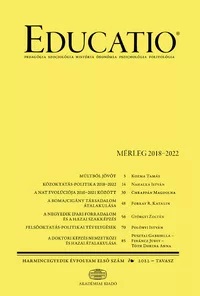Populizmus, egyházak és oktatáspolitika a 2010 utáni Magyarországon
Populism, Churches and Education Policy in Hungary - after 2010
Author(s): Eszter NeumannSubject(s): School education, State/Government and Education, Sociology of Education
Published by: Akadémiai Kiadó
Keywords: education policy; neoconservatism; populism; postsecularism; religion
Summary/Abstract: The aim of this review of the latest political sociology literature is to situate the education policy changes and the transformation of state-church relations in Hungary after 2010 in the broader international context and to review the possible theoretical frameworks and conceptual tools for analysing the process. To interpret the discoursive level of education policy, I discuss the role of religion – and Christianity in particular – in the political communication of the European populist movements, and the characteristic traits of the neoconservative ideology in education policy. Then I turn the discuss the relationship between ideology and policy practice as well as the characteristics of populist policy-making. Finally, I explore the institutional relationships between church and state with a special focus on the structural and organizational transformations that may arise with the politicization of religion and the growing institutional participation of church maintainers.
Journal: Educatio
- Issue Year: 31/2022
- Issue No: 3
- Page Range: 343-355
- Page Count: 13
- Language: Hungarian

